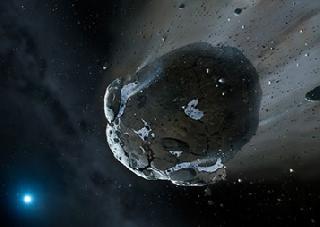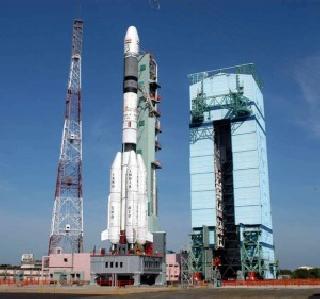
Artist's view of watery asteroid in white dwarf star system GD 61. A NASA/Hubble image
LONDON (PTI): In a first, astronomers have found a water-rich rocky planetary body outside our Solar System with basic ingredients for a habitable planet, raising hope for presence of alien life in the cosmos.
Scientists believe the discovery of the remnants of a rocky world with huge amounts of water is the first time they have found these basic ingredients for life in one place outside the Solar System.
A new study at the Universities of Warwick and Cambridge analysed the dust and debris surrounding the white dwarf star GD61 170 light years away.
Using observations from Hubble Space Telescope and the large Keck telescope on Hawaii, scientists found an excess of oxygen - a chemical signature that indicates that the debris had once been part of a bigger body originally composed of 26 per cent water by mass. By contrast, only approximately 0.023 per cent of Earth's mass is water.
The researchers suggest it is most likely that the water detected around the white dwarf GD 61 came from a minor planet at least 90 km in diameter but potentially much bigger, that once orbited the parent star before it became a white dwarf.
In its former life, GD 61 was a star somewhat bigger than our Sun, and host to a planetary system, researchers said.
About 200 million years ago, GD 61 entered its death throes and became a white dwarf, yet, parts of its planetary system survived.
The water-rich minor planet was knocked out of its regular orbit and plunged into a very close orbit, where it was shredded by the star's gravitational force.
The researchers believe that destabilising the orbit of the minor planet requires a so far unseen, much larger planet going around the white dwarf.
"At this stage in its existence, all that remains of this rocky body is simply dust and debris that has been pulled into the orbit of its dying parent star," Professor Boris Gansicke of the Department of Physics at the University of Warwick.
"In these remnants lie chemical clues which point towards a previous existence as a water-rich terrestrial body.
"Those two ingredients - a rocky surface and water - are key in the hunt for habitable planets outside our solar system so it's very exciting to find them together for the first time outside our solar system," said Gansicke.
"The finding of water in a large asteroid means the building blocks of habitable planets existed - and maybe still exist - in the GD 61 system, and likely also around substantial number of similar parent stars, lead author Jay Farihi, from Cambridge's Institute of Astronomy, said.
"These water-rich building blocks, and the terrestrial planets they build, may in fact be common - a system cannot create things as big as asteroids and avoid building planets, and GD 61 had the ingredients to deliver lots of water to their surfaces," Farihi said.
The study was published in the journal Science.
 Previous Article
Previous Article Next Article
Next Article













The Indian Air Force, in its flight trials evaluation report submitted before the Defence Ministry l..
view articleAn insight into the Medium Multi-Role Combat Aircraft competition...
view articleSky enthusiasts can now spot the International Space Station (ISS) commanded by Indian-American astr..
view article